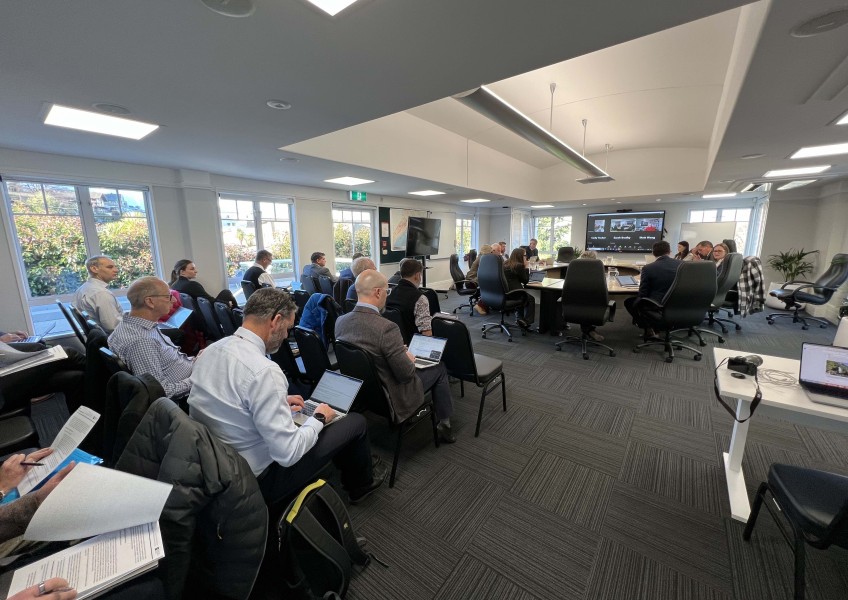Majority of QLDC risk committee members refuse to answer Crux Lakeview questions

At a meeting of the Queenstown Lakes District Council Audit, Finance and Risk committee last week Crux presented the results of the Lakeview community survey to committee members and asked a series of public interest questions – but only two out the six committee members have replied.
The Crux Lakeview Survey showed 89 percent of community respondents wanted a review of council chief executive Mike Theelen’s sole authority over the $1 billion Lakeview project. Crux asked the committee members to carefully read the comments written by survey respondents.
We’ve published the full replies from the two committee members that did respond below – councillor Lyal Cocks and councillor Niki Gladding.
Those that did not reply or acknowledge they had read the survey and associated comments are chair Stuart McLauchlan, deputy chair Heath Copland, Bill Moran and councillor Lisa Guy.
It is expected that the question of Mr Theelen's sole delegated Lakeview authority will be raised again at the next full council meeting.
Our questions:
- Why have you as a committee member allowed the QLDC CEO to maintain sole delegated authority over the Lakeview project when the deal negotiated, and the associated outcomes, have produced very large costs to the ratepayer instead of benefits?
- Given that the Lakeview agreement involves relatively high risk – short term costs against uncertain long term benefits – how can that deal structure be defended in the light of QLDC’s responsibility to the community to avoid risk, keep costs as low as possible, be transparent and in the context of the subsequent extreme ratepayer cost blowout that appears not to be covered, managed, mitigated or limited in the Development Agreement?
- Do you support a review of the CEO’s sole delegated authority over Lakeview – please give your reasons for being in favour or against?
- How do you explain the fact that QLDC does not yet have a permanent, revised procurement policy and guidelines over two years after the Office of Auditor General required such action?
- Council overheads. Business Desk has reported this morning that QLDC has 124 staff earning more than $100,000 a year but less than 24% of staff were directly involved in delivering core services such as infrastructure, regulation and customer facing roles. This is compared to a national average of 55%. Can you please comment on the article that reports the view that: “The council (QLDC) needs to look to those other councils around the country who have managed much more affordable rates increases and aim to return to a focus solely on core council functions at a time when money is tight.”
Councillor Lyal Cocks (only one answer to five questions)
“The Lakeview Project was negotiated and approved by the previous Council, as was the delegation to the CEO. This is a very long-term project and decisions made to date by the CEO under the delegation have not resulted in large costs to the ratepayer. The infrastructure work required to be done by Council was consulted on and approved in the current Long Term Plan (LTP). So yes, budgeted costs up front for the longer-term benefits negotiated.
“A number of things have contributed to the large percentage average increase in rates, not just one project. Higher interest rates, greater debt due to leaky homes payouts, cost escalation of ‘shovel ready’ projects and operational costs, have all had a significant impact. These issues will have a big influence on the next LTP and review of operational expenses, with the aim of rates being affordable in subsequent years.”
Councillor Niki Gladding
Question 1
The AFRC’s decision didn’t affirm the delegation to the CE - the AFRC can’t do that. Its resolution (to agree that the existing Lakeview delegation is appropriate) is meaningless - it serves no purpose unless staff are planning to use it to convince councillors that there’s no need to debate the delegation. What’s disappointing is that the AFRC has let itself be used to exacerbate a Governance Risk when it should be working to highlight and eliminate the risk.
Question 2
The Development Agreement was signed by the CE without the elected members ever setting eyes on the document. I’ve read the deal and I would never have agreed it. That said, what matters now is what’s ahead and making the best decisions for the community. With ‘super-profits’ looking very unlikely we need to protect the non-financial outcomes and minimize externalities (like the costs of providing parking). Based on what I’ve seen of the decision-making process over nearly 4 years, I strongly believe that key decisions that impact QLDC’s return on investment need to be made by the full Council. And we need to improve our assessment process.
Question 3
Any new Council should have the opportunity to reaffirm, amend, or revoke existing delegations. It’s also important that whenever councillors are concerned about how any delegation is being exercised, they’re able to use the Notice of Motion process to bring the matter to the Council Table. Councillors are the ones responsible for decisions made under delegation; it’s their call to make and they need to be able to make it in a timely way. Finally, whether individual councillors want to leave the Lakeview delegation in place or amend it, they should support the debate and a decision made in public. So should the Mayor. And so should the AFRC.
Question 4
QLDC does have a new Procurement Policy and Guidelines (adopted 2022). My understanding is that these will continue to be reviewed and improved.
Question 5
The article is behind a paywall, but I can comment on the statement regarding rates. Councillors need to demand greater input into the Annual Plan and Ten Year Plan Processes. As it stands, the information we receive and the time we have for discussion and debate is highly managed (and limited). With the Annual Plan there was a large amount of time spent debating the relatively inconsequential stuff, and very little time spent debating things that might have led to chunky reductions to the rates increase. But what matters now is that Councillors get a grip on the Ten Year Plan process to ensure that we, and the community, can have meaningful input early in the process.

























